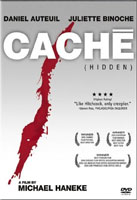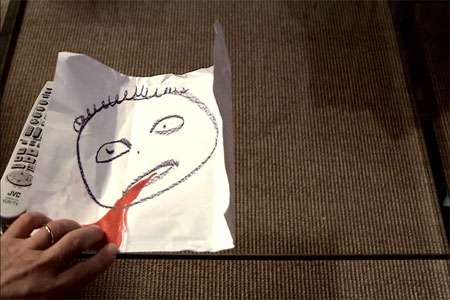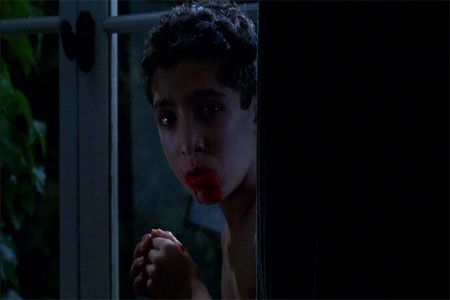 BUY IT AT AMAZON: CLICK HERE!
BUY IT AT AMAZON: CLICK HERE!
STUDIO: Sony Pictures Classics
MSRP: $26.96
RATED: R
RUNNING TIME: 118 Minutes
SPECIAL FEATURES:
• Behind the scenes featurette
• Interview with director Michael Haneke
• Trailers
The Pitch
"It’s a whodunit where whodunit isn’t important!"
The Humans
Daniel Auteuil, Juliette Binoche, Maurice Bénichou and Walid Afkir
The Nutshell
Georges Laurent seems to have a pretty good life. He sits around in his fancy home with hundreds of books lining the shelves being dour and mopy like a true intellectual, then hosts a show about books on television where he chats with other dour intellectuals. Naturally he’s either in France or the bizarro dimension because this program about books actually gets good ratings instead of being stuck on C-SPAN 2 or PBS.

If you’d like to save your money, just stare at this picture for 90 minutes while listening to someone speak in French for the authentic Cache experience.
Both his home and professional lives are jolted by the arrival of mysterious packages on his doorstep – surveillance videotapes of his home wrapped in crude children’s drawings. The surveillance tapes are naturally unnerving, but it’s the drawings that dredge up painful memories from Georges’ childhood and events that he still feels guilty about almost fifty years later. On a hunch, Georges seeks out the man he feels is responsible for the tapes and confronts his painful past head-on.
The Lowdown
Unlike traditional thrillers, the point of Cache is not to solve the “whodunit.” The central mystery of the film only exists as a catalyst to start a chain of events. The focus is on the relationships between the people and how they break down once the mystery is introduced in their lives. The film focuses on the issue of trust in a relationship and how a lack of it can easily disintegrate the so-called perfect family.
The film also focuses on guilt. Georges is filled with guilt over something that occurred when he was six years old. It’s something he knows he shouldn’t feel guilty over and insists he was right about. He was only six years old. He was still a foolish young boy who was selfish and self-centered like most children are. It’s easy and understandable to explain his actions away in this manner. However, no matter how much he insists upon this, he still feels guilty over what he did as a child even as he is well into middle age.

What an incredible work of post-modernist expression in a materialistic society.
It’s easy to understand the director’s aim and what he was trying to make you focus on as a viewer of the film. That doesn’t mean it’s satisfying. There are portions of the film where it seems Haneke is deliberately trying the audience’s patience. It supposedly adds to the mystery of the film if you can’t tell what scenes are live and which are taped footage. It works on a visual level but comes at the expense of the film’s pacing and narrative. It’s devoting several minutes of the film to nearly static shots – shots from a camera that by the director’s own admission only serves to get the plot rolling and are very insignificant in relation to the film’s goal.
By the third time the film focuses on a static shot, the trick no longer works or remains interesting in the slightest. The static shots can make a viewer zone out and no longer pay attention, which is a shame since the last stationary shot in the film actually does contain information with some significance.
To call Cache a mystery or a thriller is misleading. It’s not much of a mystery because there are very few clues or any time spent on solving it. Georges picks a suspect almost instantly and sticks with him the entire time. It isn’t very thrilling because there’s no action and all the characters act pretty nonchalant about the whole deal. At its core, Cache is a character study that focuses on trust and how we can live with people for decades and still know very little about them. If you go into the film with that mindset, you may find Cache to be an interesting and revealing film. If that’s not your type of film, be prepared for a massive case of cinematic blue balls.

Kool-Aid Man molestation is nothing to joke about.
The Package
There are no fluffy extra features on this disc, only a 30 minute interview with the director and a 30 minute behind the scenes featurette. The interview is the meatier of the two, as Haneke describes exactly what he aimed to do with the film and explains all the mysteries the film has to offer.
Haneke is incredibly candid and honest about the way he crafted the story and openly admits that certain questions, including the central mystery of the film, have no answers. He also talks about how important the married relationship was in the film, stating that in an American movie the conflict would have bonded the couple closer together instead of driving them farther apart.
The featurette isn’t anything special. It’s got all the featurette stalwarts: people setting up cameras, shots of the director waving his arms all about, exciting editing room footage and all the stars praising the director for being brilliant and talking about what a great time they had on the film. Haneke already goes into such depth in his interview footage that this featurette seems superfluous.